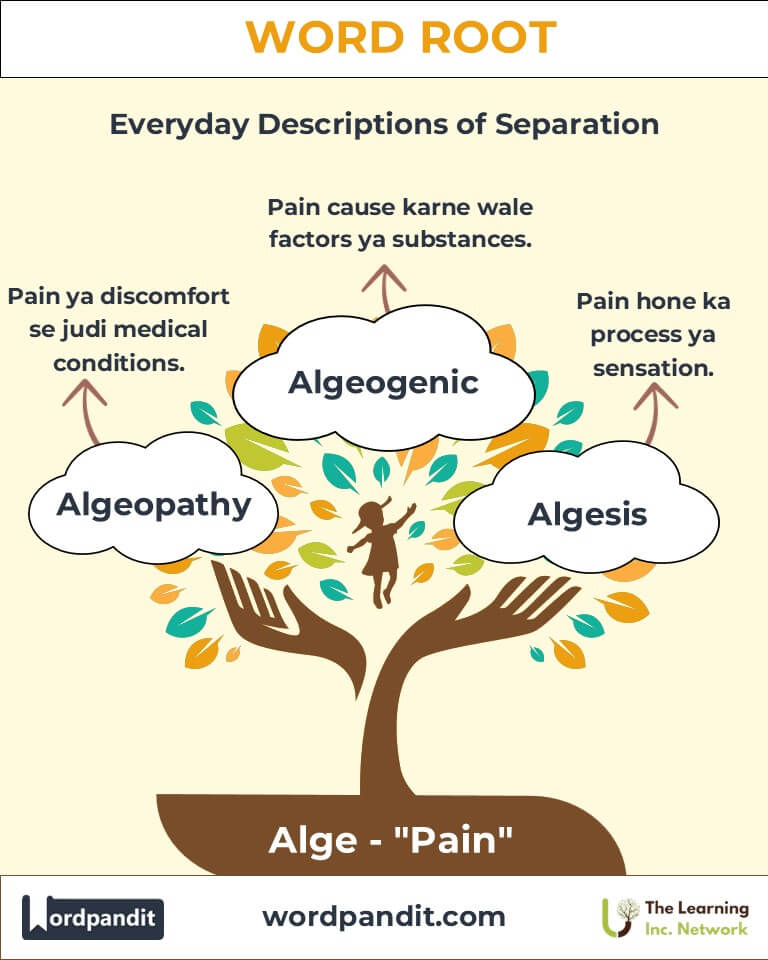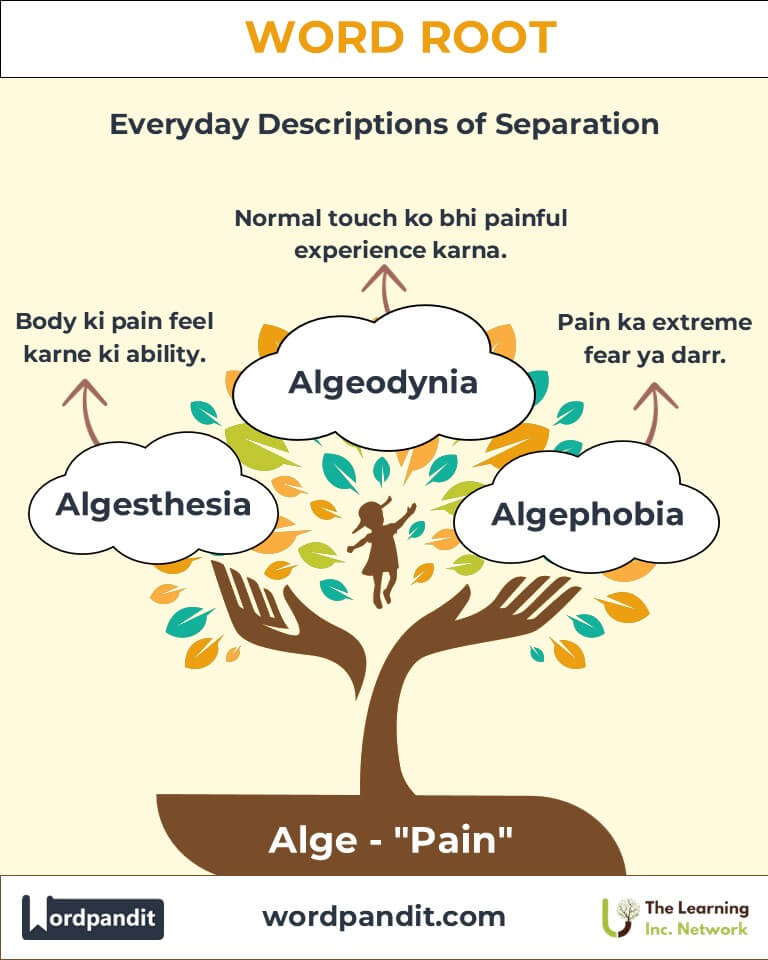Alge: The Root of Pain in Language and Medicine
Discover the fascinating depth of the root "alge," originating from Greek, meaning "pain." This root underpins a range of medical and everyday terms that describe discomfort, its alleviation, and its causes. Explore how "alge" has evolved to become an essential part of our vocabulary in healthcare and beyond.

Table of Contents
- Introduction: The Essence of "Alge"
- Etymology and Historical Journey
- Mnemonic: Unlocking the Power of "Alge"
- Common Alge-Related Terms
- "Alge" Through Time
- "Alge" in Specialized Fields
- Illustrative Story: "Alge" in Action
- Cultural Significance of the "Alge" Root
- The "Alge" Family Tree
- FAQs about the "Alge" Word Root
- Test Your Knowledge: "Alge" Word Root Quiz
- Conclusion: The Living Legacy of "Alge"
Introduction: The Essence of "Alge"
What do "analgesic" and "neuralgia" have in common? Both derive from the root "alge" (pronounced "al-jee"), meaning "pain" in Greek. This linguistic root is fundamental in describing physical discomfort and its relief. From ancient medical texts to modern pharmaceuticals, "alge" bridges the understanding of suffering and healing, resonating across cultures and disciplines.

Etymology and Historical Journey
The root "alge" originates from the Greek word algos, meaning "pain" or "ache." It first appeared in medical terminology in ancient Greece, where physicians like Hippocrates used it to describe ailments. As medical science advanced, "alge" traveled through Latin and into English, becoming a cornerstone of medical language, especially in describing conditions involving pain and its alleviation.
Mnemonic: Unlocking the Power of "Alge"
Mnemonic Device: "Imagine a lightning bolt striking a nerve, symbolizing pain—'alge' is the spark that defines discomfort."
To reinforce this association, visualize the word "alge" written across a glowing nerve diagram, emphasizing its link to sensations of pain.
Common Alge-Related Terms
- Analgesic (an-uh-LEE-sik): A medication that reduces or eliminates pain.
- Example: "The doctor prescribed an analgesic to relieve her migraine."
- Neuralgia (noo-RAL-juh): Pain along a nerve or nerve pathway.
- Example: "Neuralgia caused a sharp, stabbing sensation in her face."
- Myalgia (my-AL-juh): Muscle pain.
- Example: "After the marathon, she experienced severe myalgia in her legs."
- Odontalgia (oh-don-TAL-juh): Tooth pain.
- Example: "He visited the dentist because of persistent odontalgia."
- Gastalgia (gas-TAL-juh): Stomach pain.
- Example: "Gastalgia after meals led her to consult a gastroenterologist."
"Alge" Through Time
- Ancient Greece: The term algos was foundational in medical texts, used to describe ailments and symptoms.
- Renaissance Medicine: The Latin algia suffix became prevalent in medical terminology as physicians categorized conditions more systematically.
- Modern Use: With advancements in pain management, terms like "analgesic" gained prominence, highlighting humanity’s ongoing quest to alleviate suffering.
"Alge" in Specialized Fields
- Medicine:
- Neuralgia: Diagnosing and treating nerve-related pain conditions.
- Example: Treatments include nerve blocks and medications to manage neuralgia.
- Pharmacology:
- Analgesics: Development of pain-relief drugs such as aspirin and opioids.
- Example: Research on non-opioid analgesics is expanding due to concerns about addiction.
- Psychology:
- Psychalgia: Emotional pain, often linked to grief or trauma.
- Example: Therapy helps patients cope with psychalgia and its effects.
- Dentistry:
- Odontalgia: Emphasizes the importance of oral health in pain prevention.
- Example: Dental interventions address odontalgia caused by cavities or infections.
Illustrative Story: "Alge" in Action
Dr. Priya, a neurologist, treated a patient named Mark who suffered from debilitating neuralgia. Through a combination of targeted analgesics and lifestyle changes, Mark gradually regained control over his life. Inspired by his progress, Mark wrote a book about living with chronic pain, calling it "Beyond Alge: Finding Strength in Healing."
Cultural Significance of the "Alge" Root
The concept of pain is universal, shaping cultural expressions and practices. From ancient remedies to modern pain management techniques, societies have sought to understand and alleviate discomfort. Phrases like "pain is inevitable, but suffering is optional" reflect the philosophical and medical importance of addressing pain.

The "Alge" Family Tree
- Pathos (Greek: suffering)
- Example: Pathology (study of disease).
- Noc (Latin: harm)
- Example: Nociceptor (a nerve cell that detects pain).
- Dolor (Latin: pain)
- Example: Dolorous (feeling or expressing great sorrow or pain).
- Pyr (Greek: fire)
- Example: Pyrexia (fever, often associated with burning pain).

FAQs About " Alge "
Q: What does "alge" mean, and where does it come from?
A: "Alge" is derived from the Greek word "algos," meaning pain. It serves as a linguistic root for various medical and scientific terms used to describe pain, its causes, and remedies. Its origins in ancient Greek medicine underline its enduring relevance across disciplines.
Q: What is an analgesic, and how does it work?
A: An analgesic is a medication designed to reduce or eliminate pain without causing loss of consciousness. Common analgesics include over-the-counter drugs like aspirin or ibuprofen, which reduce inflammation, and prescription opioids, which block pain signals in the nervous system.
Q: What causes neuralgia, and how is it treated?
A: Neuralgia is pain that follows the path of a nerve, often resulting from nerve damage, inflammation, or compression. Treatments vary based on the cause but can include medications like anticonvulsants, nerve blocks, physical therapy, or even surgery in severe cases.
Q: How is "alge" used in emotional or psychological contexts?
A: Though primarily medical, "alge" is also used metaphorically to describe emotional pain, as seen in terms like "psychalgia" (mental or emotional pain). It illustrates how the language of physical discomfort extends to intangible experiences.
Q: What is the difference between myalgia and neuralgia?
A: Myalgia refers to muscle pain, often caused by overuse, injury, or illness. Neuralgia, on the other hand, involves sharp, burning pain along a nerve, typically due to nerve damage or irritation. While both involve pain, the underlying causes differ significantly.
Q: Why is "alge" important in medical terminology?
A: "Alge" provides a systematic way to describe various types of pain (e.g., odontalgia, myalgia) across medical disciplines. This clarity helps healthcare professionals communicate and diagnose conditions effectively.
Q: Can analgesics address all types of pain?
A: No, analgesics are generally effective for mild to moderate pain. Severe or chronic pain may require more specialized treatments, such as nerve blocks, physical therapy, or surgical interventions.
Q: How has the concept of "alge" evolved over time?
A: The root "alge" originated in ancient Greek medical practices to describe physical pain. Over centuries, it has evolved to include terms that cover a wide range of conditions, from localized pain (e.g., odontalgia) to systemic issues like neuralgia and even emotional pain.
Test Your Knowledge: " Alge " Mastery Quiz
1. What does the root "alge" signify?
2. Which term describes sharp, burning pain along a nerve?
3. What is the primary function of an analgesic?
4. What does gastalgia refer to?
5. Which root is related to "alge" in meaning?
Conclusion: The Living Legacy of "Alge"
The root "alge" offers profound insights into the universal experience of pain and its alleviation. From ancient Greek medicine to modern healthcare, it remains pivotal in understanding and addressing discomfort. As science advances, "alge" continues to guide our efforts to ease suffering and enhance well-being, symbolizing humanity's resilience and compassion.














